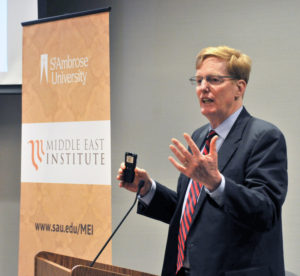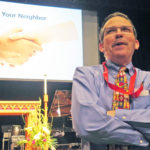By Lindsay Steele
The Catholic Messenger
DAVENPORT — At St. Ambrose University’s Middle East Institute Spring Conference, Middle East studies expert Joshua Landis expressed fear for what could happen to some Syrian refugees if they remain in camps without access to work or education.

Joshua Landis, director of the Center for Middle East Studies and associate professor at the University of Oklahoma’s College of International Studies, speaks at the Middle East Institute Spring Conference at St. Ambrose University April 24.
“If we don’t do something, in 10 years they’re going to get armed and become terrorists,” he told the crowd of about 100 at the April 24 conference, listing anger and helplessness as fuel for this type of behavior.
Helping the refugees settle and receive work and education opportunities would be more beneficial down the road than simply trying to contain and destabilize ISIS forces in the Middle East, he believes. Politically, the U.S. government sees refugee situations as a human rights issue as opposed to a strategic problem that warrants immediate action.
“Syria is not our baby,” he said. “There is no trade with them. There are no diplomatic relations.” The U.S. has never had a vested interest in Syria, he explained. They aren’t a source of our oil and we haven’t done much commerce with them overall. “It would be hard to go from 0 to 60 overnight.”
Trying to stabilize Syria would be costly, especially at a time in which U.S. citizens are tired of spending money in the Middle East and would rather invest that money nationally. Additionally, the path to stability in Syria is not clear, since it was neither politically nor economically stable prior to the revolution, Landis said.
Landis is the director of the Center for Middle East Studies and associate professor at the University of Oklahoma’s College of International Studies. His daily newsletter, Syria Comment, is read by more than 100,000 people each month. He fielded questions from the audience after his 30-minute presentation.
Mayor Bill Gluba of Davenport asked about the political implications of what is going on now in Syria, with ISIS and religious displacements. Landis replied that the U.S. views keeping ISIS out of Iraq as more important than keeping ISIS out of Syria, since the U.S. has already spent more than 1 trillion dollars in Iraq. “We have chased (ISIS) out of Iraq but essentially don’t know what to do with them in Syria. … We probably could solve Syria’s problem, but we’d have to spend hundreds of billions of dollars to do it.”
Kent Ferris, diocesan director of Social Action, attended the conference and perked up when Landis explained that refugees in and out of Syria are at risk of becoming terrorists if they aren’t given an opportunity to work or receive an education. It validated concerns that Catholic Relief Services (CRS) and its Caritas partners in the region have had about the situation. Ferris said to The Catholic Messenger, “Anytime you’re talking about people in crisis mode for an extended period of time, the element of despair can creep in.”
He was frustrated to hear a political science expert talking about how the U.S. …“has no appetite for any involvement, saying they shouldn’t get involved because it won’t work out well. There needs to be a response to those in the refugee camps. … It isn’t only a matter of helping with immediate needs.”
He is, however, encouraged by the fact that CRS and Caritas partners have been working to meet the needs of Syrian refugees both in-country and in surrounding countries, as well as giving reports to Congress and asking them not to cut any existing human assistance funds to the region. They are “committed to helping those who have found themselves in dire circumstances in refugee camps.”
Landis’ presentation was one of four presented at the conference. Ryan Dye, director of international education for St. Ambrose University and coordinator of the Middle East Institute, was pleased with how the conference gave participants an opportunity to discuss and gain a more well-rounded view of issues involving the Middle East. “It’s an extremely relevant topic. There are important events taking place in the Middle East. We get sound bites from the media, but it’s rare to have conversations about (the Middle East) with leading experts in the field.”
SAU’s Middle East Institute
Middle East Institute is the first academic institute in the state of Iowa devoted to the study and discussion of the Middle East. It seeks to provide a nonpartisan public forum to engage thoughtfully with key issues impacting the region. Initial funding for the Institute has been provided by the Adler-Schermer foundation. The institute also sponsors a scholar-in-residence program. This year’s scholar is Hamideh Sedghi, a leading Middle Eastern studies lecturer and teacher who has served as a consultant to the United Nations Economic and Social Council. Sedghi facilitated the Middle East Institute Spring Conference.
Ryan Dye, director of international education for St. Ambrose University and coordinator of the Middle East Institute, plans to make the Spring Conference an annual event. Audience members included students, clergy, community members and a group of 19 students from the University of South Dakota.











